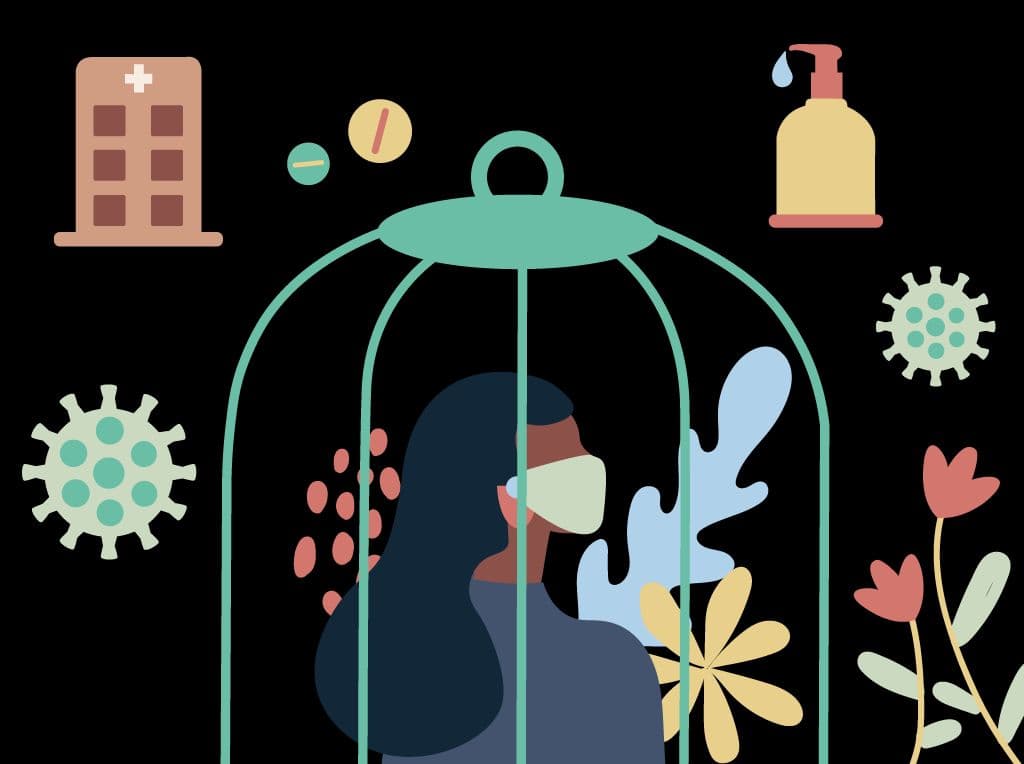This blog has been compiled by Komal Adhlaka, a content writer for Proactive For Her.
A disease or illness exhausts the body and depletes it of all the necessary nutrition which leads to a delay in recovery. The coronavirus pandemic has taken the world by storm. Various studies show that even mild or moderate COVID-19 symptoms can lead to damage to the lungs, heart, brain, and stomach. With proper diet, light exercise, self-isolation (in mild and moderate cases), doctor’s care, and following the government’s protocols, recovery from the viral infection becomes faster. Amongst all the mentioned ways, proper diet plays a major role in helping a patient overcome the weakness caused by the infection.
Why is diet important in Covid-19 recovery?
- COVID-19 takes a toll on the immunity system and leaves the patient weak.
- Various health experts across the globe, recommend that people who’re recovering from COVID-19 need more proteins than carbs to help repair their bodies.
- Besides, they need a sufficient amount of minerals and vitamins to help to get back their strength and boost their immune system.
- This infection is likely to reduce your appetite, and the patients usually lose their ability to taste, smell and swallow. So, a COVID-19 diet should keep all these factors in mind while recovering from it.
What to eat when you’re recovering from COVID-19?
Since people recovering from COVID-19 should consume a diet to restore muscle, immunity, and energy levels, here’s a list of ways to make your diet full of nutrients needed for your recovery.
The Government of India recommends the following foods to help recover from the infection:
- COVID patients should focus on consuming foods that would help rebuild muscles, immunity, and energy levels.
- Various foods rich in protein should be taken. For example, chicken, fish, eggs, paneer, soy, nuts, and seeds are recommended.
- Whole grains like ragi, oats, and amaranth are recommended.
- Healthy fats like almonds, walnuts, olive oil, mustard oil are recommended.
- About 5 Servings of fruits and vegetables to get adequate vitamins and minerals are recommended.
- Regular but light physical activity, yoga, and breathing exercises (pranayama) are advised.
- Small amounts of dark chocolate with at least 70% cocoa may be taken to get rid of anxiety.
Turmeric milk may be taken once a day to boost immunity.
The following detailed guidelines can be followed while planning a diet to recover from Covid-19:
1. Choose rich sources of proteins
- Protein is essential for the healthy functioning of our body and immune system.
- Protein can be obtained from both animal- and plant-based sources, such as pulses, beans, fish, eggs, dairy products, and meats.
- Our protein requirement changes depending on age, weight, dietary requirement, etc. For instance, adults are recommended to eat at least 0.85 g of protein per kg body weight daily. Hence, we should choose protein-rich foods that help us meet our dietary needs and support a healthy and sustainable diet.
2. Eat plenty of fruits and vegetables
- Fruits and vegetables are rich in vitamins, minerals, phytochemicals, and fiber needed by our body for normal immune function.
- We must consume at least 5 portions (equivalent to around 400g) of fruits and vegetables every day. While fresh fruits and vegetables are the best sources of the above-mentioned nutrients, frozen, canned, dried, and juiced (maximum 1 serving per day) may be consumed if fresh fruits and vegetables are not available.
3. Choose whole grains over refined grains
- Whole grains, unlike refined grains, are packed with vitamins, minerals, and fiber. Besides, whole grains also provide huge amounts of carbohydrates which give us energy and can help us feel fuller for longer periods.
4. Reduce the intake of foods and drinks high in fat, sugar, and salt
- Foods and drinks that are high in fat, sugar, and salt such as cookies, potato chips, chocolate, sugary and carbonated drinks, resulting in more calorie consumption than our body needs.
- Since these foods do not provide too many nutritional benefits, they must be consumed in small amounts.
5. Replace saturated fats with unsaturated fats
- Not all fats affect our health in the same manner. Replacing saturated fats with unsaturated fats helps to lower your LDL (bad) cholesterol levels and reduce our risk of heart diseases.
- A way to do this is by reducing our intake of foods such as fatty meats, high-fat dairy products like cheese, and tropical oils like walnut oil and rather consuming foods such as nuts, oily fish, olive oils, etc.
6. Control portion sizes
- A little awareness of the portion size of specific food can help plate different foods at a time and maintain the required energy balance in our body. This also helps avoid under-or overeating.
7. Drink more fluids
- Keeping hydrated is essential for overall health. The amounts of water consumption depend on our age, sex, weight, height, level of physical activity, and environmental conditions.
- Considering that around 20-30% of the water we need comes from our food, one must drink at least 2.5-3 liters of water daily to keep hydrated and feel less bloated.
- Water can be accompanied by some lemon, cucumber, mint, etc to get some refreshment. Other drinks such as sugar-free coffee or tea, kadha, sparkling water, unsweetened infused water, etc. are also good sources for hydration.
8. Get vitamin D in isolation
- The sun is the best source of vitamin D. Therefore, individuals are recommended to isolate themselves in rooms where there are windows that provide adequate ventilation as well as permit the sunlight to pass through them. Those who are unable to get sunlight exposure, are recommended to take a Vitamin D supplement and eat vitamin D-rich foods.
- The recommended vitamin D intake for different age groups are:
- 15 µg/day for adults (18+ years), children (1 – 17 years), and pregnant women
- 10 µg/day for infants (7 – 11 months)
- 10 µg/day for breastfed infants (0 – 7 months)
A quick tip: If you’re getting sunlight exposure, do not sit for more than 15-30 minutes and before you sit, slather some sun protecting serum or moisturizer to prevent skin allergies or burns.
9. Follow the COVID-19 protocols at groceries
- It is very important to note that there is no need to stock groceries as the grocery stores remain open for some time every day during the pandemic. It is helpful if we consume fresh groceries.
- While your caretakers, who go grocery shopping, must wear double-mask, avoid touching their face, maintain social distancing from other customers and the vendor at the store, not touch the groceries or hard surfaces, keep a sanitizer handy and wash the groceries and their hands, mouth, and feet after they come back home from the grocery.
10. Prepare or eat food safely
Not just during the pandemic, but it is essentially necessary to maintain good food safety practices to minimize the risk of foodborne illnesses. Therefore, while handling or preparing food, make sure to:
- Wash your hands for 20 seconds with soap before and after preparing or eating food
- Cover your mouth and nose with a tissue or your sleeve when you cough or sneeze while cooking or eating and remember to wash your hands after
- Keep raw and cooked foods separate to avoid harmful microbes contained in them from spreading to other foods
- Make sure to cook or/and reheat foods to adequate temperatures (≥72°C for 2 mins)
Final Words
COVID-19 can affect your sense of taste and smell, and lead you to feel that your food is bland. Recovering from the infection may take some time but maintaining a healthy diet may lead to faster recovery and strengthening your immune system against the virus. While you’re still recovering, make sure you don’t eat or drink anything that affects your health adversely. You must not eat pizzas, burgers, cold drinks, too many spices, etc. Also, do not eat stale food. Your safety should be your only priority, so stick to fresh, home-cooked meals which are prepared in sanitary conditions.
Disclaimer - This information is provided for educational purposes and should not be construed as medical advice. Please consult with your healthcare practitioners before undertaking any changes in your diet or adding supplements.
ProactiveForHer is a digital clinic for women, offering accessible, personalized, and confidential health-care solutions. We offer products and services for out-patient health concerns of Indian women, across their lifetime - from puberty to pregnancy to menopause. To know more on the sexual and reproductive health of women, visit https://www.proactiveforher.com/

